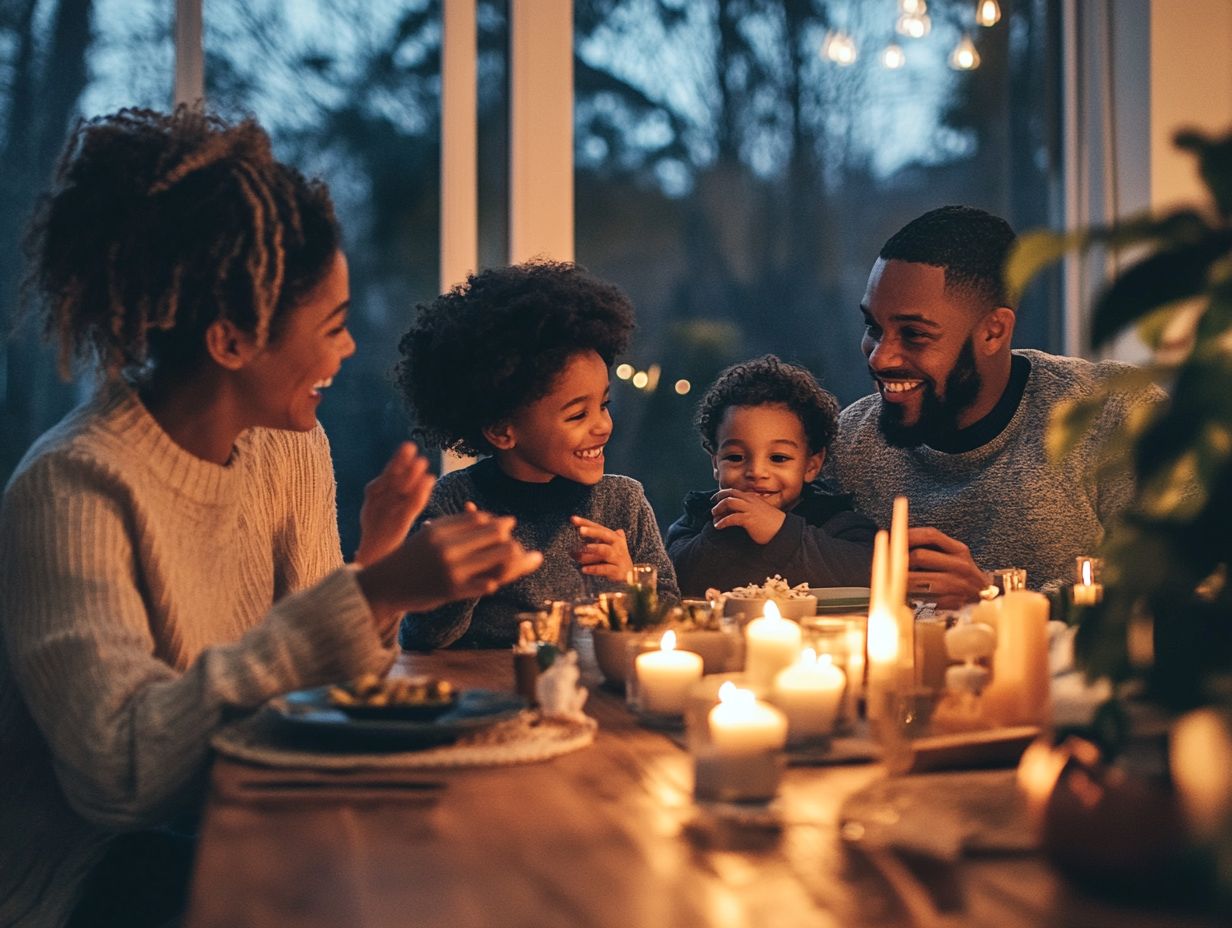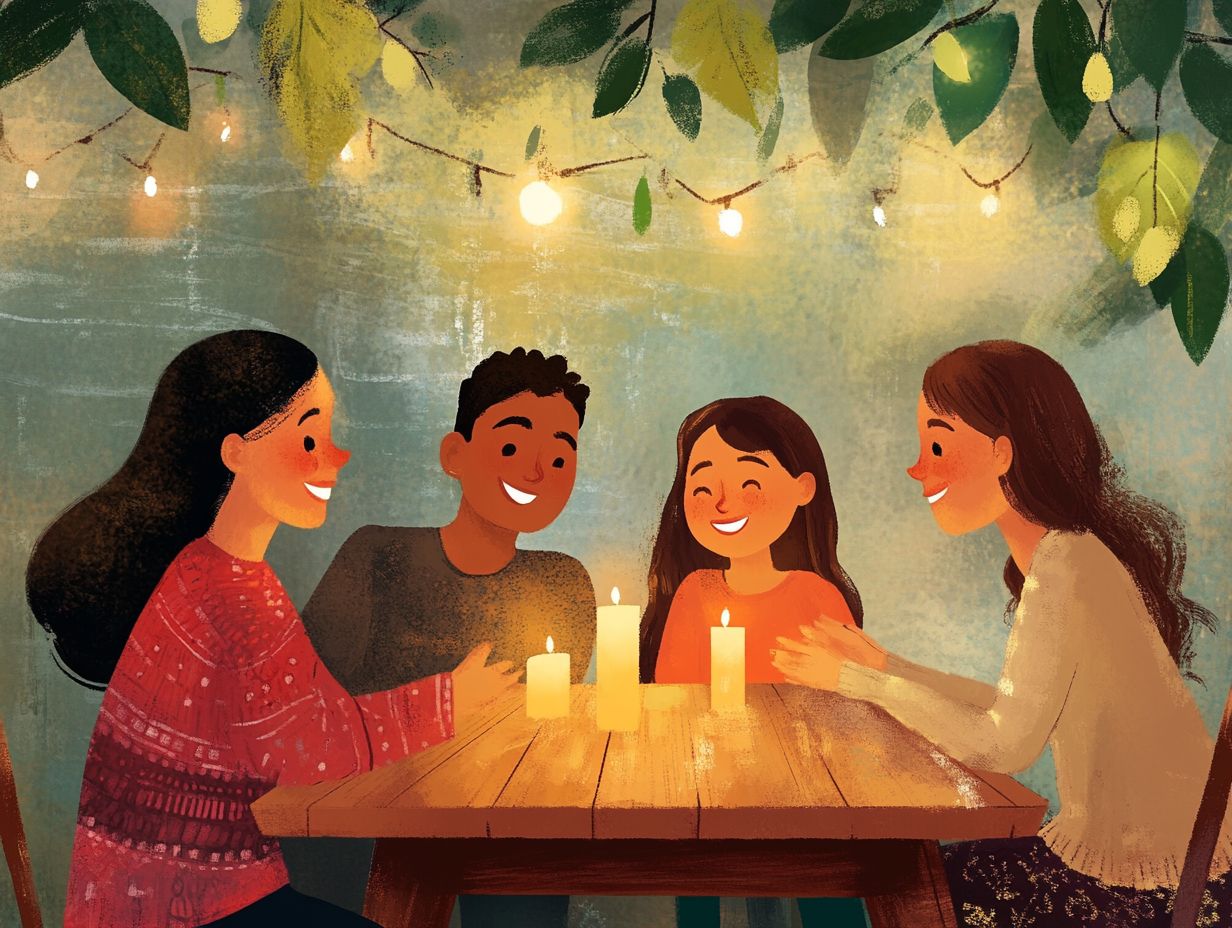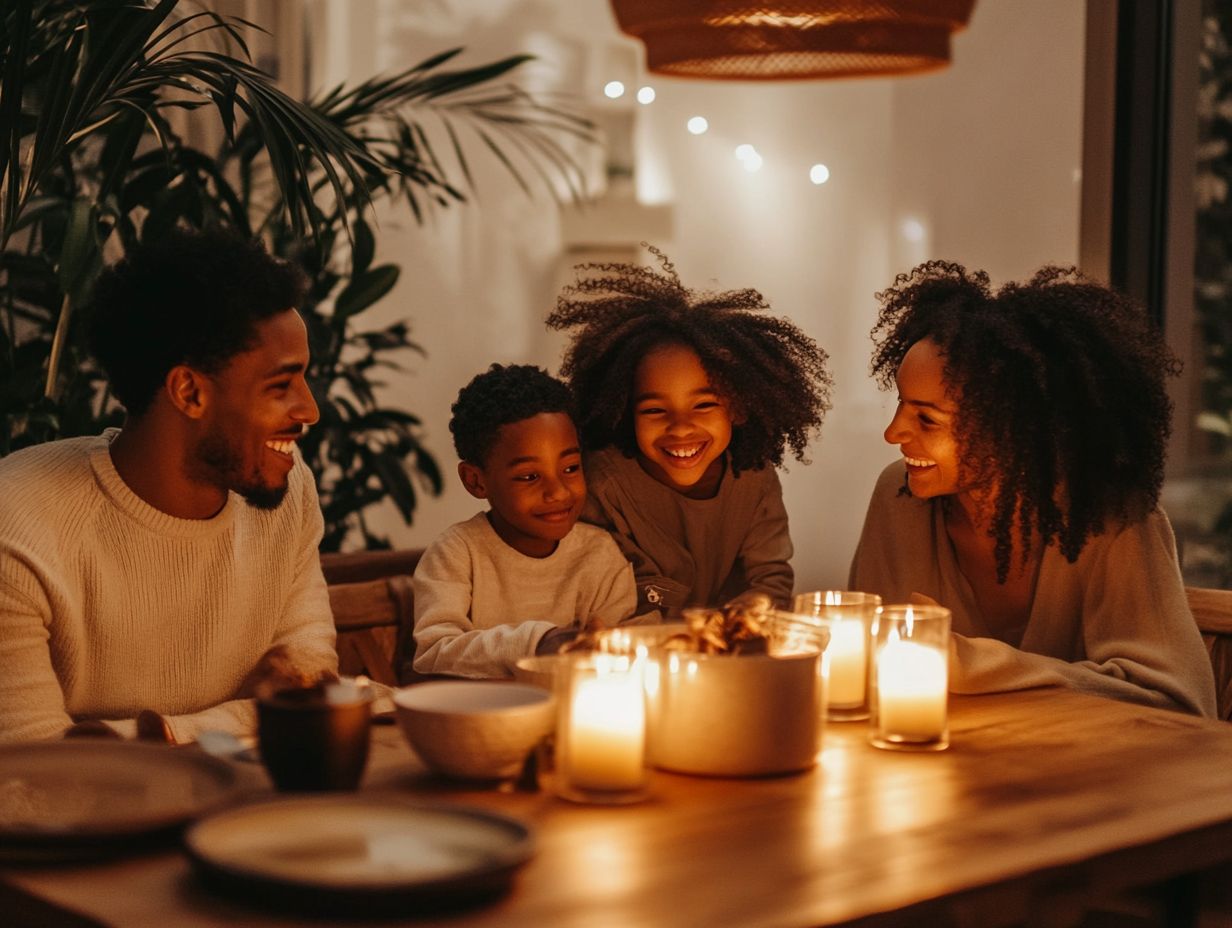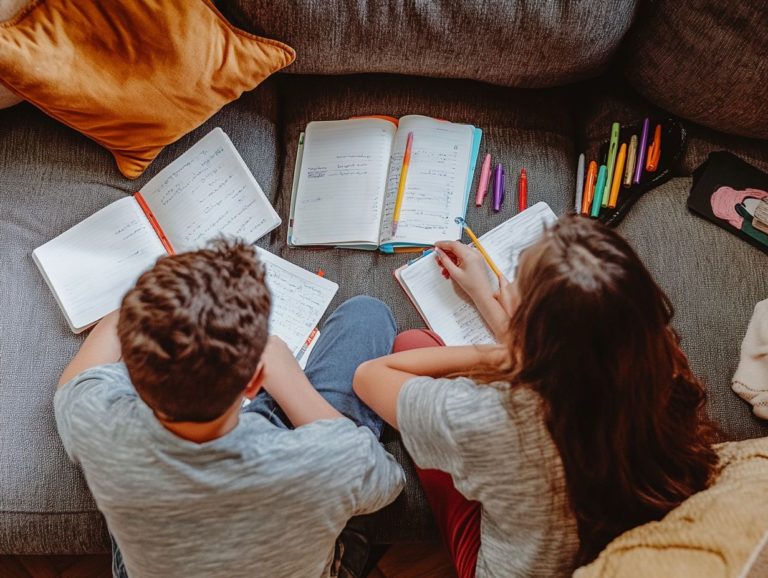Creating Rituals for Family Communication
In today s fast-paced world, you may find that maintaining strong family connections can be quite a challenge. However, rituals and traditions play a crucial role in nurturing effective communication within families, providing a structured way for you to share thoughts, feelings, and experiences.
This exploration delves into the significance of rituals in enhancing family interactions, showcasing their remarkable ability to promote regular communication, build trust, and create safe spaces for those difficult conversations. These practices strengthen family bonds, create meaningful moments, and foster happiness.
You ll discover practical examples and tips to help you establish your own family rituals, making it easier to strengthen those essential bonds that matter so much. These rituals can include activities like family dinners, bedtime stories, and volunteering together.
Contents
Key Takeaways:

- Rituals promote regular communication among family members, fostering kindness and compassion.
- Rituals build trust and connection, creating a safe space for difficult conversations.
- Creating your own rituals for family communication involves identifying common interests, setting a regular time and place, and involving all family members. This encourages shared responsibilities and nurtures togetherness.
Why Are Rituals Important for Family Communication?
Rituals play a vital role in fostering effective communication within your family, offering structured moments where you can connect deeply, share your thoughts, and nurture those all-important emotional bonds.
Psychologist Barbara H. Fiese notes that family rituals enhance relationships and happiness, promoting a sense of stability in your home. Celebrations like Ramadan, Diwali, and Halloween enrich your family’s cultural identity, promoting love and positivity.
These shared practices whether it s bath time with your daughter, cherished family dinners, or unique greetings during holidays like Christmas, Chanukah, and Ramadan enrich your family’s cultural identity and lay a solid foundation for open communication.
How Can Rituals Improve Family Communication?
Family rituals are valuable tools for enhancing communication among members. They create a deep sense of belonging, encourage active involvement, and nurture mindfulness, gratitude, and positivity during shared experiences.
Engaging in regular activities like family game nights or dinner discussions provides opportunities for everyone to express their thoughts and feelings openly. This openness creates deeper connections that truly matter, strengthens emotional bonds, and fosters childhood memories and shared responsibilities within the family.
Such meaningful interactions cultivate happiness and elevate the overall dynamics of your family life.
1. Promotes Regular Communication
Establishing family rituals promotes regular communication by setting aside specific times for family members to share their thoughts, experiences, and feelings. This practice fosters deeper connections, understanding, and compassion among everyone involved.
Engaging in activities like bedtime stories or weekly family meetings serves as platforms for open dialogue where everyone can express their emotions and share personal narratives. These moments help in articulating feelings and validating individual experiences, significantly enhancing the family’s emotional climate and bonding.
As you and your family members actively participate in these routines, you build trust and empathy, further strengthening your bonds. This ongoing dialogue creates an atmosphere where vulnerabilities can be shared, paving the way for healthier relationships and enriching family dynamics that can withstand life’s challenges. Moreover, these activities can be special moments that promote creativity and change within the family.
2. Builds Trust and Connection
Family rituals serve as a cornerstone for building trust and connection, offering consistent opportunities for you and your loved ones to engage in meaningful interactions. These moments reinforce emotional bonds and cultivate a sense of security within your family unit. They also help in fostering an emotional connection that is crucial for family relationships.
Cherished practices, whether it s volunteering together at an animal shelter or soup kitchen, or using a gratitude jar where family members can anonymously express their appreciation for one another, create an environment where everyone feels valued and heard. In these nurturing settings, you can openly share your thoughts and experiences, deepening your emotional ties and understanding of one another.
Regular participation in these rituals reflects your collective commitment to core values, personal values, and fosters a profound sense of belonging.
As you and your family members experience moments of gratitude or engage in collective efforts, you naturally cultivate trust and stability. This creates a safe space where vulnerability is not only welcomed but wholeheartedly supported.
3. Encourages Active Listening
Engaging in family rituals encourages you to practice active listening, compelling you to focus on the words and feelings of those around you. This attention fosters a deeper understanding and connection among family members.
These shared moments, whether you re gathering around the dinner table for a meal or diving into a spirited game night, present invaluable opportunities to strengthen familial bonds. During these occasions, you can embrace mindfulness, setting aside distractions to truly absorb not just the spoken words but also the underlying emotions that are being expressed.
This kind of intentional communication creates a safe space where everyone feels valued, allowing your family dynamics to flourish. By prioritizing these rituals, you not only sharpen your listening skills but also enhance your ability to empathize with each other’s experiences, enriching your relationships in profoundly meaningful ways.
4. Provides a Safe Space for Difficult Conversations

Family rituals create a welcoming atmosphere for those tough conversations, allowing you and your loved ones to share your feelings and concerns without the fear of judgment. This approach fosters an emotional connection and deeper understanding among family members.
By establishing routines like weekly family meetings or designated check-in times, you cultivate a structured environment where everyone feels enabled to express their thoughts. During these moments, family members can explore the challenges they face whether it s stress from school, pressures from work, or personal issues. This not only encourages open communication but also reinforces family values by highlighting the importance of support and active listening.
When you discuss emotions in a dedicated setting, you cultivate trust and strengthen those bonds, fostering a sense of belonging and reassurance that every voice matters in the family landscape.
What Are Some Examples of Rituals for Family Communication?
Consider incorporating rituals that elevate family communication, such as sharing meals together, enjoying family game nights, and expressing gratitude. Other activities like loving-kindness meditation and volunteering at a nursing home can also create meaningful family interactions.
Each of these practices not only fosters a profound sense of togetherness but also strengthens the bonds between family members, enriching your relationships in meaningful ways.
1. Family Mealtime Discussions
Family mealtime discussions serve as an exceptional ritual for fostering communication, providing you with a regular opportunity to share experiences, thoughts, and feelings in a relaxed atmosphere.
These gatherings become a vital platform for forging strong emotional bonds, allowing you to express yourself openly in an environment that cultivates appreciation and understanding. As you gather around the table, conversations flow effortlessly, covering daily events, offering support during challenging times, and celebrating each other’s achievements, which only serves to deepen your connection.
Engaging in mealtime discussions helps instill shared values and nurtures a sense of belonging within your family. Ultimately, these regular interactions create a culture of openness, ensuring that every member feels valued and heard, which significantly enhances the family’s overall resilience, emotional well-being, and positivity.
2. Weekly Family Meetings
Weekly family meetings can become a structured ritual that encourages open dialogue, allowing you and your loved ones to voice concerns, celebrate achievements, and discuss responsibilities in a nurturing environment.
This dedicated time together not only fosters transparency within your household but also reinforces a culture of accountability. By carving out time for these discussions, you create a space where routine responsibilities and shared tasks can be delegated and managed collaboratively.
When family members share their progress on tasks or express challenges, it nurtures a sense of collaboration, strengthening the bonds among everyone involved. The regular exchange of thoughts and feelings during these meetings can significantly enhance communication, ensuring that each person feels heard and valued, ultimately leading to a more harmonious family dynamic.
3. Family Game Nights
Family game nights offer a delightful ritual that not only entertains but also cultivates communication and bonding through shared experiences and laughter. These events bring fun and joy to family time, creating cherished memories.
In this relaxed atmosphere, you and your family can let your guards down, engage in playful banter, and relish the thrill of friendly competition. These moments do more than just break the ice; they strengthen relationships, allowing everyone to swap stories and create lasting memories. Activities like chores and shared tasks also contribute to family bonding in meaningful ways.
As you navigate through different games, you ll find that teamwork skills flourish and a deeper appreciation for each other s strengths and perspectives emerges. The laughter exchanged during a game has the power to heal rifts and foster understanding, making game nights an invaluable tradition that underscores the significance of togetherness and connection in our busy lives.
4. Sharing Gratitude at the End of Each Day
Sharing gratitude at the end of each day becomes a meaningful ritual that encourages you and your family to reflect on positive experiences, fostering deeper emotional connections and enhancing overall communication.
This practice not only helps you appreciate the little joys that might have slipped through the cracks but also strengthens the bonds among your family members. When everyone takes turns expressing what they re thankful for, it cultivates an atmosphere rich in support and understanding.
Over time, these shared moments weave a tapestry of positive memories that can serve as a buffer against the inevitable challenges life throws your way. By incorporating gratitude rituals whether during mealtime discussions or bedtime reflections you promote mindfulness and an intentional focus on the good. This allows your family to navigate life s ups and downs with both resilience and unity.
How Can You Create Your Own Rituals for Family Communication?

Establishing your own rituals for family communication can significantly strengthen bonds and ensure that every member feels valued and connected. This practice fosters a happier and more cohesive family environment, enriching your collective experience together.
1. Identify Common Interests and Activities
Identifying common interests and activities among family members is the essential first step in creating effective rituals. These shared experiences foster a sense of belonging and strengthen the bonds that hold your family together.
Engaging in open conversations and encouraging each person to share their passions helps uncover activities that resonate with everyone. This exploration helps pinpoint collective interests, building closer relationships and showcasing your genuine curiosity about one another’s preferences.
These insights pave the way for developing unique rituals, such as a weekly game night, cooking together, or enjoying outdoor adventures. Such practices reinforce family dynamics, create lasting memories, and enhance communication, laying a solid foundation for the importance of creating family rituals, fostering a more cohesive and supportive family environment.
2. Set a Regular Time and Place
Establishing a regular time and place for family rituals is key to ensuring consistency and reinforcing the importance of communication and bonding within your family unit.
This dedicated time fosters a profound sense of belonging and security, allowing your family members to engage meaningfully in one another s lives. By scheduling activities whether it s game nights, cooking sessions, or weekend outings you cultivate cherished traditions that deepen your emotional connections.
These rituals create an environment where everyone feels valued, encouraging open dialogue and shared experiences. As you and your loved ones look forward to these moments, you strengthen your ties and develop treasured memories that last a lifetime. Isn t that what makes family special?
3. Involve All Family Members
Involving each family member in the creation and participation of rituals ensures that everyone feels included, valued, and responsible for nurturing positive communication and bonding.
By actively encouraging everyone to share their ideas and preferences, you cultivate an environment where appreciation and respect thrive. This collective effort deepens relationships and enables individuals to take ownership of the rituals, making them more meaningful.
Alternating roles within these shared activities fosters a sense of accountability, making each person feel like an essential part of the family unit. These collaborative rituals lay the groundwork for open dialogues, allowing family members to express themselves and connect on a deeper level, ultimately enhancing your overall familial ties.
4. Be Consistent and Flexible
Being consistent yet flexible with your family rituals allows you to adapt your communication while maintaining a sense of regularity, ensuring that everyone s needs and dynamics are respected.
As family members grow and evolve, the practices that once brought joy may need some tweaking to foster genuine connection and strengthen those important bonds. This balance encourages open dialogue about which rituals resonate with everyone, from the youngest to the oldest.
For instance, the way you structure shared meals or game nights can evolve to reflect the varying interests and schedules of each family member. By embracing this dynamic approach, you cultivate an environment where everyone feels involved and valued, promoting participation and a deeper emotional closeness.
Frequently Asked Questions
What is the importance of creating rituals for family communication?

Creating rituals for family communication is important because it brings structure, consistency, and meaning to interactions with loved ones. It strengthens relationships and fosters a sense of belonging and connection within the family.
How can I start creating rituals for family communication?
You can start by identifying the needs and values of your family and finding activities or practices that align with them. It can be as simple as having a family meal every Sunday or a game night every Friday. The key is to make it a regular and intentional practice.
Start creating your family rituals today and watch your connections grow!
Rituals for Family Communication
What are some examples of rituals for family communication?
Examples include weekly family meetings to discuss important issues and gratitude circles before dinner. Here, everyone shares something they are thankful for. Daily check-ins are also great for family members to share their highlights.
How can rituals for family communication improve relationships?
Rituals create a safe space for open communication. They help resolve conflicts and foster strong relationships through quality bonding time.
Can creating rituals for family communication benefit children?
Absolutely! Rituals offer children security and a strong sense of belonging. They also teach values like communication, teamwork, and respect.
How can we maintain and adapt rituals for family communication over time?
Regularly assess and adapt rituals as your family evolves. Involve everyone and remain open to new ideas. Keep the purpose of your rituals clear and adjust as needed.






